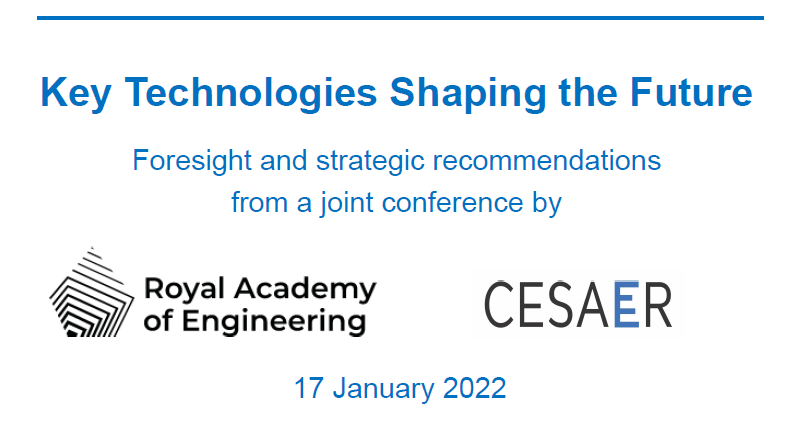
The Royal Academy of Engineering (RAEng) and CESAER, the European association of leading specialised and comprehensive universities of science and technology, published their statement with foresight and strategic recommendations on key technologies for the next 30 years, and their implications for today.
The Statement(available in this link) is the culmination of a work commenced in 2020 by a joint task force consisting of Fellows from the Academy and representatives from CESAER Members. The Task Force was Chaired by Professor G.Q. Max Lu AO DL FREng FAA FTSE (Chair of joint Task Force Key Technologies and President and Vice-Chancellor of the University of Surrey).
The efforts of the joint task force culminated in the international conference “Key technologies shaping the future” from 1 to 2 July 2021 (video recordings from the conference are freely available online).
In addition, interviews were conducted with invited experts. This conference statement summarises key conclusions and provides a synthesis of findings from the conference and the interviews. The objective was to look over the immediate horizon, and for the experts to be visionaries, as well as practical, guiding governments and funders in shaping policy for a desired future.
Dr Marlene Kanga, WFEO President 2017-2019, was one of the experts that contributed to the conference and the Statement, in particular to “Envisioning and Learning and teaching in 30 years.”
The conference statement includes five take-away messages:
- Live values. To guide the development of key technologies, reaffirming and adhering to values is foundational.
- Meaningful leadership must be backed by sustainable funding and long-term commitment. The disruptive potential of key technologies can only be effectively guided with long-term commitments through systems-based and socially inclusive approaches.
- Big data is an unstable foundation. Availability and integration of large-scale data sets and interconnectedness of digital assets are the foundations on which many key technologies (such as artificial intelligence) are based, and today this foundation is fragmented.
- Empower researchers to assume their role. Key technologies are shaped by and will shape the global environment, and researchers, learners, and teachers must be empowered to engage globally with their peers. Key technologies cross disciplinary boundaries and old-fashioned ‘disciplinary siloed, lone-wolf competition’-based approaches must be fully replaced by team-based collaboration at the interface of technology and society and enable effective collaboration to address whole system challenges.
- Equality, diversity and inclusion as the foundation for key technologies. To serve society’s diverse needs, equality, diversity and inclusion must be an integral part of our work on key technologies, and included in any ethical frameworks.
The conference statement is available in this link (PDF) for distribution.
Contributed by: Dr Marlene Kanga, WFEO President 2017-2019.
MAR
2022
